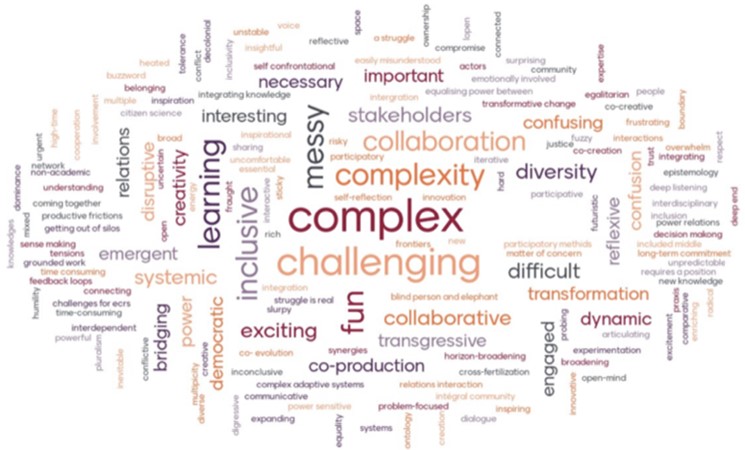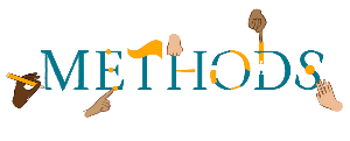by Patricia Pérez Belmont, Umbela Transformaciones Sostenibles
How can research methods inform and catalyse change towards more sustainable worlds? Last month, the STEPS Centre held an online event to launch a series on the theme of ‘Challenging Research’.
Over the last 15 years, STEPS has worked to shift discourses on the politics of sustainability to recognize and appreciate multiple pathways to sustainable futures. This task means challenging the methods people use to produce knowledge about the world. It also raises questions about how this knowledge can deliberately support emancipatory struggles towards alternative pathways of change.
The work and experiences of STEPS and its network of collaborators has fed into a framework for thinking about methods, by drawing attention to two parameters: ‘what goes in’ and ‘what comes out’. Broadly speaking, ‘what goes in’ refers to the dimensions and perspectives attended to by the method, and how those dimensions can be relatively narrow or relatively broad. ‘What comes out’ relates to how the result of the method closes down or opens up opportunities to inform and catalyze change.
In principle, this framework includes a variety of methods that range from expert to participatory, quantitative to qualitative, and analytical to deliberative. As our audience shared at the beginning of the webinar, they have used or encountered a diversity of methods as sustainability researchers and practitioners.
How methods are shaped
Even though many methods are available, there are many factors that influence which ones are used, and in which settings. At our event, Andy Stirling pointed out that along the journey of working on methods, we have found that some methods can help to prefigure, catalyze and reinforce the emergence of more emancipatory discourses and practices.
But political and institutional circumstances, as well as deeper structures of cultures and power, can make it challenging for methods to work for greater pluralities, or give chance to usually ignored and oppressed pathways for change. In other words, “it is a dialectic in which the methods help to shape the environment, but the environment is crucial to set the conditions on where the methods can work”.
One of the lessons shared is that there is still much to learn about how methods can engage with aspects such as systems complexity, political economy, and the structures in which we are immersed and that have to do with power and oppression (including modernity, coloniality and patriarchy).
Nevertheless, even though methods can be challenging, they can also be fun and exciting: they can push us to reflect and care about how the methods can become a horizontal instrument while they oscillate between diversity and adaptation, between new types of change, while they flourish through learning from failure, instead of being an instrument of control.

The STEPS Centre has played a part in recent waves of critical research and activist scholarship, but there have been many other waves in the past, and others that are yet to come, in seeking more plural transformations to sustainability that challenge structures of power. At last month’s webinar, presenters from three of the ‘waves’ connected to STEPS described their ways of working and methodological challenges: Bioleft in Argentina, Umbela in Mexico, and the Africa Research and Impact Network in Kenya.
Bioleft
Anabel Marin shared the experiences of Bioleft, a wave that originated 10 years ago working with the pathways approach on issues of economies for innovation. The journey would require breaking with the precepts of classical economics in order to incorporate concepts of plurality.
Bioleft works primarily in the area of seed exchange: the project has created an ‘open source’ system for developing and exchanging seeds and knowledge among farmers, growers and breeders. In doing so, it has challenged the dominance of a few large corporations over the seed market and in Argentina.
Throughout its journey, Bioleft has gone through many iterations in formulating its questions, objectives, and its use of methods to support innovation in the seed market as an alternative pathway. Bioleft has promoted these alternative pathways through the co-design and implementation of transdisciplinary, participatory, innovative tools with the help of the collaborative network they have extended throughout their work.
Bioleft’s methodology has served to identify and understand diverse farmer visions and dreams, to follow up in the field with an immersive approach, combining skills with passions, and communicating with and involving diverse actors (consumers, farmers, etc.) in the whole production chain, treating nobody as an outsider.
Bioleft’s methods have not only had an impact on people, but also on the seeds themselves, by giving the seeds their own agency and freedom, allowing for the emergence of, for example, new varieties in taste.
Umbela
The Umbela wave is connected to insights generated through a Transformations Laboratory (T-Lab) experience in the Xochimilco urban wetland of Mexico City (a project of the STEPS North America Hub). The T-Lab was an inquiry into how to design transdisciplinary methods to enable collective agency for transformations, in a setting where there is competition for water and land, and problems with water pollution, and long-running disputes on how to solve these problems.
To approach this question, the 3-year project gathered a group of diverse actors to co-produce a process in which the participants explored the deconstruction, creation, and materialization of their narratives to move from individual to collective agency. This journey was accompanied by a suite of methodologies to foster social bonding, articulate group capacities and find alternative desired pathways.
Some of the insights of the T-Lab project inspired some colleagues to create the NGO Umbela as a space to challenge our agency as researchers, and to be more methodologically rebellious by exploring methods that address aspects such as affectivity and power asymmetries.
Umbela, together with LANCIS-IE-UNAM, IIMAS-UNAM and SOS-ASU, will be contributing to this year’s Methods theme with the project ‘Cultivating ways of knowing for transformations’. This involves a series of virtual conversations with a diversity of actors (mainly from outside academia) aimed at expanding the discussion on how to give more room for other ways of knowing and relating to the world.
With these conversations we will explore transformative experiences – and their methods and practices – that have approached more radical changes towards sustainability, and how to decolonize our minds to make room for other forms of praxis.
The conversations will follow ‘cultivating’ as a metaphor that can become a method. This metaphor entails particular moments: 1) remove the soil by going deep into the roots, into our colonial structures; 2) look for alternative seeds as different efforts, dreams, initiatives; 3) gather diverse plants or knowledges, learnings, collective projects; and, 4) nurture the ground by fostering empathy, affectivity, and commitment.
The series of the 4 virtual ‘conversatories’ following ‘cultivating’ as a metaphor
Africa Research and Impact Network (ARIN)
The Africa Research and Impact Network (ARIN) seeks to be a platform to promote a unified voice for collective action through the agency of researchers in Africa.
ARIN aims to encourage a ‘bottom-up’ approach, gathering evidence to inform policy with non-prescriptive methods, which includes a reflection on how to ‘decolonize’ science and associated methods.
Decolonizing methods requires a space for free thinking, where local knowledge and experiences challenge the dominant narratives to counter aspects around incumbent power, and a space to co-produce knowledge for sustainability research in different dimensions (e.g., international dominance methods, cross-discipline fields, gender-based norms). Therefore, some aspects to consider in decolonizing methods are to value their diversity, and to consider the philosophies that lie behind dominant or alternative methods.
Through the Africa Research and Impact Network, reflections have been carried out on the framework of methodologies, and ARIN is also developing training that explores how methods are used and how they are decolonized.
ARIN’s experience has shown that, although there are efforts and funding for research in Africa, there are relatively few research programmes that take account of perspectives ‘from below’. What is more, funding streams and research agendas are often highly influenced by agencies from outside the continent, and certain sectors (eg agriculture and health sciences) vastly dominate. There is still much to be done to challenge coloniality and power within the research system, think more deeply about how to ‘co-create’ knowledge, and allow networks of African researchers to learn from their peers and share experiences.
The most recent in a series of events organized by ARIN, on Power and Methods, explored the philosophies that guide thinking on methods, and how the influence of indigenous ideas from within Africa could be supported. Other events in the series will involve researchers, governmental and third sector organisations, and private sector actors; a book is also in development, to share thematic case studies, theoretical underpinnings, and practical implications. ARIN is also organizing a summer school in August 2021.
Further questions on methods
The speakers illustrated different waves in this transdisciplinary journey, and throughout the year, will deepen the conversation on some of the trickier aspects of challenging research – moving towards more disruptive and rebellious methodological practices.
Webinar participants offered their own ideas of what they would be excited to keep reflecting upon in upcoming events on ‘Challenging Research’:
- Making visible undesirable practices like dominant narratives and elitism in sustainability research through the decolonization of ontology, epistemology, and data.
- Materiality and non-human agency.
- Manipulation of industry and how to engage powerful actors in transformative ways that are not either ‘win-win’ or combative.
- Justice and restorative movements, while we must also look at how to support the academy to fight against the constraints of institutional culture, politics, and power dynamics at work in the (current) academic system.
- As values and meanings play a critical role, how to “Identify” people and institutions value systems?
- Decolonize methods while setting research objectives within the same frames and based on the same objectives advanced by dominant institutions.
- Making space for critical thinking throughout the education system from in primary schools and secondary schools.
The Methods website will have details of further events throughout 2021, as they are arranged – sign up to the newsletter to receive news and updates.
About Methods: OUR THEME FOR 2021
 Many methods offer ways to link knowledge and action for sustainability. But there are intense pressures to close down and narrow the way knowledge is produced and used for instrumental ends.
Many methods offer ways to link knowledge and action for sustainability. But there are intense pressures to close down and narrow the way knowledge is produced and used for instrumental ends.
What methodological assemblages, frameworks, tools and associated ways of being could help challenge these pressures, open up to more perspectives and participation in research, and allow us to pursue more plural pathways to sustainability?
